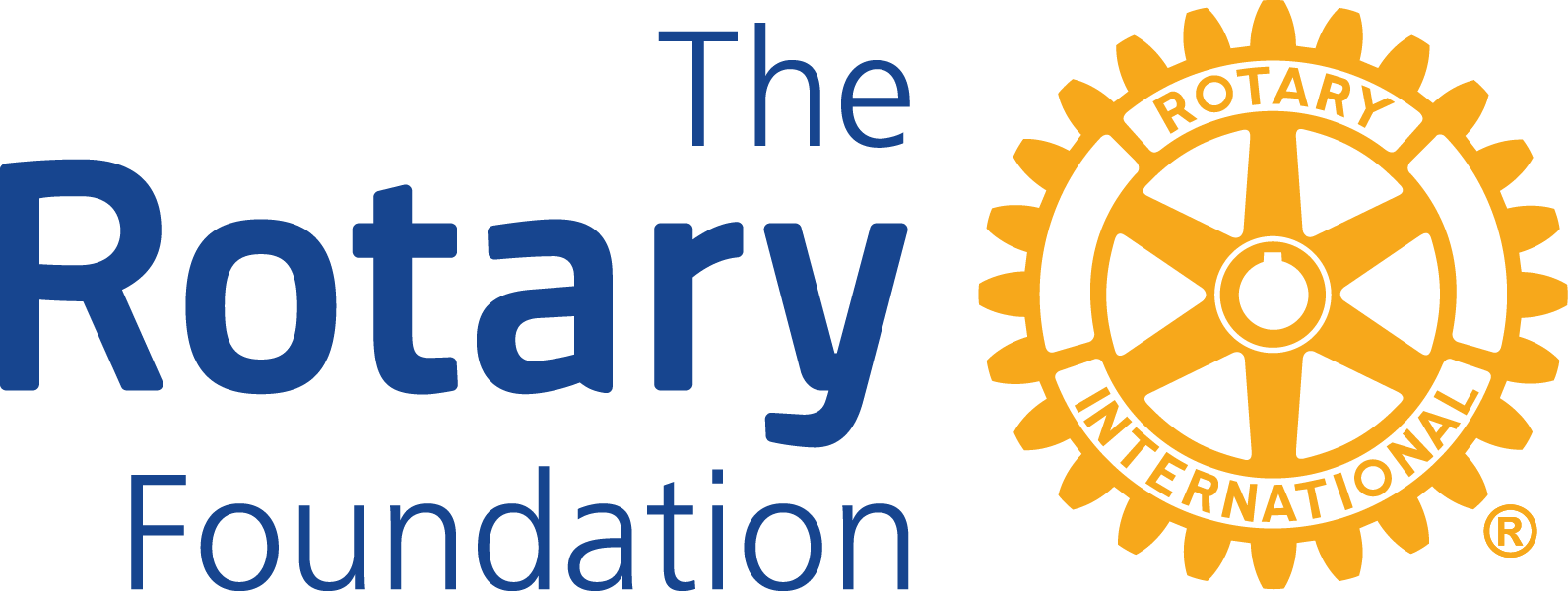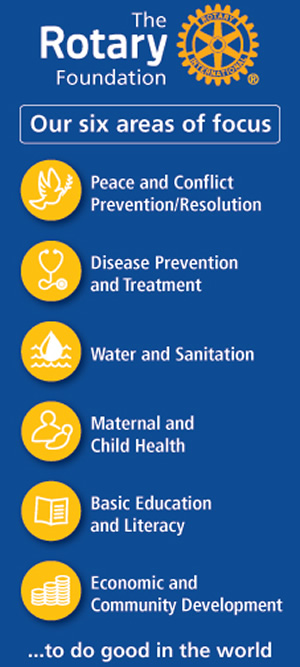The Rotary Foundation


In 1917, Rotary President Arch Klumph announced his idea for an endowment fund dedicated to “doing good in the world.” With this short statement, Klumph inspired the establishment of The Rotary Foundation.
Today, The Rotary Foundation helps clubs and districts work together to perform meaningful, sustainable service.
The Foundation is a not-for-profit corporation supported solely by voluntary contributions from Rotary members and friends of the Foundation who share its vision of a better world. This support is essential to make possible projects, funded with Foundation grants, that bring sustainable improvement to communities in need.
Our top-rated, award-winning Foundation has spent more than $3.7 billion on life-changing, sustainable projects that help people in need around the world get clean water, medical care, literacy classes, and other essentials.
Our members’ and others’ contributions to the Foundation allow us to bring sustainable change to communities in need. Ask your club’s Rotary Foundation committee chair or visit rotary.org/donate to learn how you can support our Foundation.
To learn more, download The Rotary Foundation Reference Guide or take the Rotary Foundation Basics course in Rotary’s Learning Center.
ERADICATING POLIO WORLDWIDE
O.png) ne benefit of being a Rotarian is that you can take pride in being part of an organization that truly makes a difference in the world. Since 1985, Rotarians have served as community-based mobilizers for polio eradication, motivating international groups, governments, private organizations, communities, and individuals to join the global effort to rid the world of polio. Rotary works with partners in the Global Polio Eradication Initiative (GPEI), including the World Health Organization (WHO), the U.S. Centers for Disease Control and Prevention (CDC), United Nations Children’s Fund (UNICEF), the Bill & Melinda Gates Foundation,and the governments of the world to achieve this historic public health goal.
ne benefit of being a Rotarian is that you can take pride in being part of an organization that truly makes a difference in the world. Since 1985, Rotarians have served as community-based mobilizers for polio eradication, motivating international groups, governments, private organizations, communities, and individuals to join the global effort to rid the world of polio. Rotary works with partners in the Global Polio Eradication Initiative (GPEI), including the World Health Organization (WHO), the U.S. Centers for Disease Control and Prevention (CDC), United Nations Children’s Fund (UNICEF), the Bill & Melinda Gates Foundation,and the governments of the world to achieve this historic public health goal.
As part of the effort, Rotarians contribute their time and money to the cause, raising funds, advocating for government support, serving as volunteers to help immunize children, and raising awareness in their communities. Rotary’s contributions to the global polio eradication effort now exceed $1.6 billion, including matching funds from the Gates Foundation. Hundreds of thousands of volunteers have supported National Immunization Days. Since 1988, more than 2.5 billion children have received oral polio vaccine, and we’ve achieved a 99.9 percent reduction in polio cases. It may be considered the greatest humanitarian service the world has ever seen, and every Rotarian can take pride in the achievement.
O
.png) ne benefit of being a Rotarian is that you can take pride in being part of an organization that truly makes a difference in the world. Since 1985, Rotarians have served as community-based mobilizers for polio eradication, motivating international groups, governments, private organizations, communities, and individuals to join the global effort to rid the world of polio. Rotary works with partners in the Global Polio Eradication Initiative (GPEI), including the World Health Organization (WHO), the U.S. Centers for Disease Control and Prevention (CDC), United Nations Children’s Fund (UNICEF), the Bill & Melinda Gates Foundation,and the governments of the world to achieve this historic public health goal.
ne benefit of being a Rotarian is that you can take pride in being part of an organization that truly makes a difference in the world. Since 1985, Rotarians have served as community-based mobilizers for polio eradication, motivating international groups, governments, private organizations, communities, and individuals to join the global effort to rid the world of polio. Rotary works with partners in the Global Polio Eradication Initiative (GPEI), including the World Health Organization (WHO), the U.S. Centers for Disease Control and Prevention (CDC), United Nations Children’s Fund (UNICEF), the Bill & Melinda Gates Foundation,and the governments of the world to achieve this historic public health goal.As part of the effort, Rotarians contribute their time and money to the cause, raising funds, advocating for government support, serving as volunteers to help immunize children, and raising awareness in their communities. Rotary’s contributions to the global polio eradication effort now exceed $1.6 billion, including matching funds from the Gates Foundation. Hundreds of thousands of volunteers have supported National Immunization Days. Since 1988, more than 2.5 billion children have received oral polio vaccine, and we’ve achieved a 99.9 percent reduction in polio cases. It may be considered the greatest humanitarian service the world has ever seen, and every Rotarian can take pride in the achievement.
To learn how you can support Rotary’s efforts to eradicate polio, visit endpolio.org.
ROTARY PEACE CENTERS
The Rotary Peace Centers at seven leading universities around the world offer advanced educational opportunities for Rotary Peace Fellows, professionals who wish to pursue or advance a career in peacebuilding and conflict resolution. Each year, up to 100 fellows are selected from around the world to begin either a master’s degree or a certificate program in conflict resolution, peace studies, or international relations. Rotary districts may nominate as many candidates as they wish for the competitive selection process every year. Rotary Peace Fellows have gone on to serve as leaders in government, nongovernmental organizations, the military, law enforcement, education, humanitarian action, restorative justice, and international agencies such as the United Nations.
The Rotary Peace Centers at seven leading universities around the world offer advanced educational opportunities for Rotary Peace Fellows, professionals who wish to pursue or advance a career in peacebuilding and conflict resolution. Each year, up to 100 fellows are selected from around the world to begin either a master’s degree or a certificate program in conflict resolution, peace studies, or international relations. Rotary districts may nominate as many candidates as they wish for the competitive selection process every year. Rotary Peace Fellows have gone on to serve as leaders in government, nongovernmental organizations, the military, law enforcement, education, humanitarian action, restorative justice, and international agencies such as the United Nations.
ROTARY GRANTS
The Rotary Foundation offers grants that support humanitarian projects, scholarships, and vocational training teams. Global grants support large international projects with long-term, sustainable outcomes in one or more of Rotary’s areas of focus. They typically range from $30,000 to $200,000. District grants fund smallerscale,short-term projects that address immediate needs in your community or abroad. Clubs can leverage Rotary Foundation grants
with DDF and SHARE funds to maximize projects’ impact. To learn more, talk to your club or district Rotary Foundation committee chair or visit rotary.org/grants.
The Rotary Foundation offers grants that support humanitarian projects, scholarships, and vocational training teams. Global grants support large international projects with long-term, sustainable outcomes in one or more of Rotary’s areas of focus. They typically range from $30,000 to $200,000. District grants fund smallerscale,short-term projects that address immediate needs in your community or abroad. Clubs can leverage Rotary Foundation grants
with DDF and SHARE funds to maximize projects’ impact. To learn more, talk to your club or district Rotary Foundation committee chair or visit rotary.org/grants.